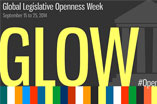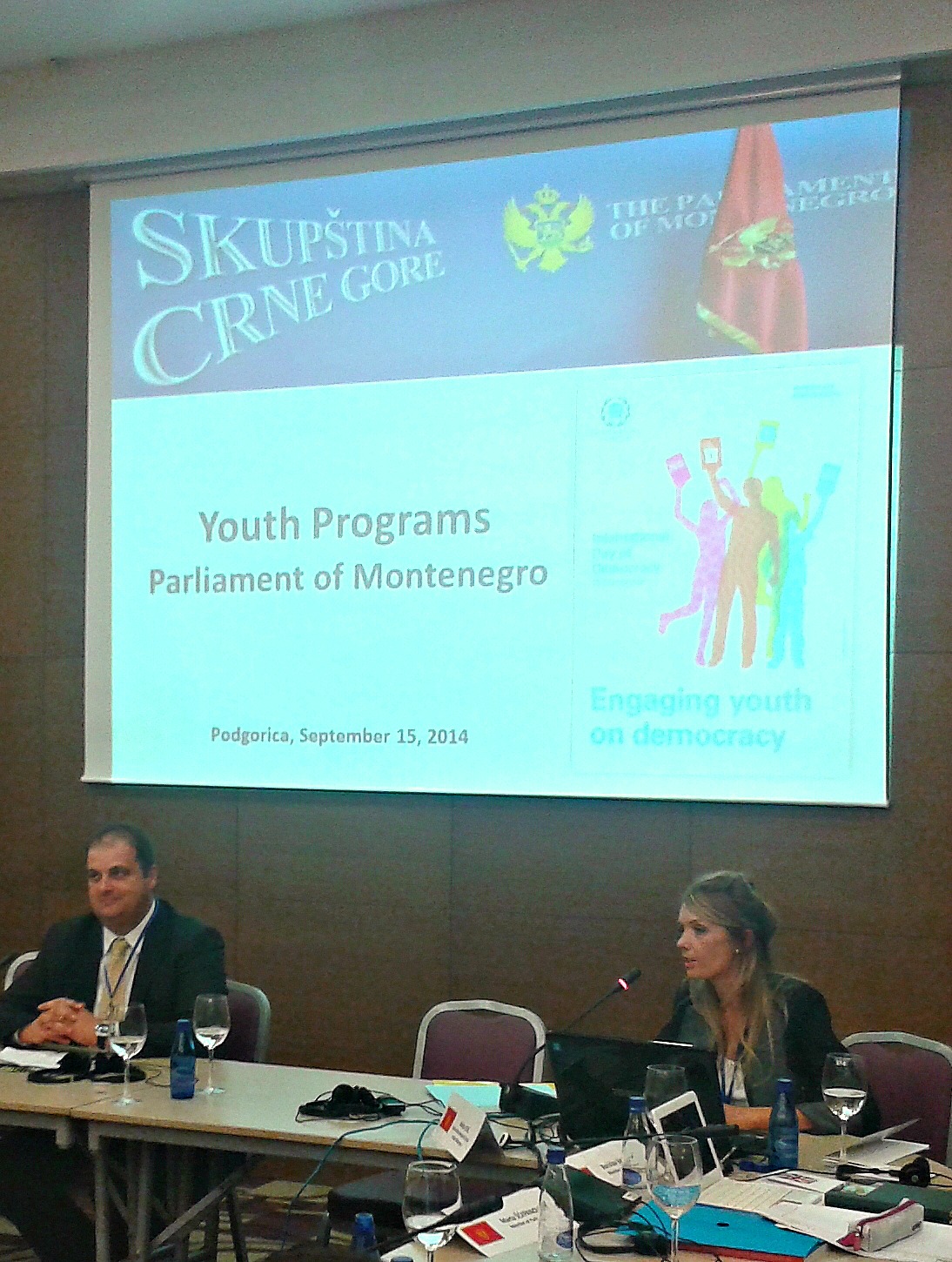
2014 – EVENTS & activities
In 2007 United Nations General Assembly resolution 62/7 decided that every 15 September should be observed as the International Day of Democracy. Since then, hundreds of International Day of Democracy events have been held in over 100 countries.
Marking the day
Events 2014
These events are just some of the ways in which countries in the Americas, Africa, the Middle East, Europe, Asia and the Pacific are marking International Day of Democracy 2014, under the theme ‘Engaging youth on democracy’.
The Andorran Parliament organised two events on the International Day. An exhibition was installed at the entrance of the new Parliament building lobby, and this will be open until the end of next January. A conference themed on youth and politics was held, involving young people from the youth organizations of political parties.
Bahrain’s Inter-parliamentary Group has organized several activities. The Council of Representatives and the Shura Council have issued two separate statements, with a large International Day of Democracy poster also displayed on the outer wall of their premises. A special television episode has been filmed – with the participation of two members of the Council of Representatives, two members of the Shura Council and two members of NGOs and youth organizations – for broadcast immediately after Bahrain 8:00 News, on BTV.
The Council of the Republic of the National Assembly of the Republic of Belarus celebrated the International Day with a special event. Mr Vladimir Senko MP – Chairman of the Standing Committee of the Council of the Republic of the National Assembly of the Republic of Belarus for Foreign Affairs and National Security – met with young people studying at the Belarusian State University. The topic of the discussion was “Democracy and human rights”.
Mr Nikolai Kazarovets MP – Chairman of the Standing Committee of the Council of the Republic for Education, Science, Culture and Social Development – met with Vitebsk State Medical University students and discussed issues of youth participation in democratic State-building.
In Brazil – as part of GLOW (Global Legislative Openness Week – see http://openparl2014.org) – the Hacker Lab of the House of Representatives held a weekend gathering of the hacker community and experts, to discuss projects about legislative transparency. All activities were open to the public, with broadcast and online participation. Meanwhile, the House of Representatives were represented at the GLOW Working Group’s meeting in Chile between 23-25 September by Assistant Director-General Cássia Botelho.
The permanent Laboratório Ráquer or “Hacker Lab” inside the Brazilian Chamber of Deputies was created through a resolution passed by the presidency of the Chamber in December 2013. The resolution mandated the creation of a physical space at the Chamber that is open for access and use by any citizen – especially programmers and software developers, MPs and other public workers – where they can utilize public data in a collaborative fashion for actions that enhance citizenship. The goal is to use technology to enhance the transparency of legislative work and increase citizen understanding of the legislative process.
Canada's Democracy Week (15–21 September 2014) aims to connect Canadians with activities that celebrate democratic values and traditions in communities across the country.
National Democracy Challenge 2014 invites Canadians aged 14 to 17 to submit a video, image or piece of writing to answer a question related to this year's theme for Canada's Democracy Week – Democracy. Own It.
As part of the global celebrations, Mr Sophoclis Fittis – Acting President of the Cyprus House of Representatives – delivered a statement to the House Plenary on 23 September 2014. The statement addressed the importance of the International Day, and challenges faced by young people given today’s rapid social and political changes. It stressed that youth participation in democratic processes should rate high on the international agenda as a way of strengthening democracy, peace and stability in the world. The Acting President also highlighted how the House of Representatives and its Members have used new technologies to build stronger contacts with citizens, and valuable ways of bringing younger generations closer to active democracy – including through the Cyprus Children’s Parliament and the many visits of students to the Parliament.
UNDP’s Resident Representative in Ethiopia, Eugene Owusu, addressed Parliament on Democracy Day, noting that it was an excellent occasion to discuss Ethiopia’s evolving democratic journey – and in particular the role of youth in deepening democracy in the country – and that democracy requires ongoing commitment from all elements of society.
Eugene Owusu said that this year’s theme of engaging young people in democracy highlighted the importance of ensuring that young people can meaningfully contribute to and benefit from a country’s development and decisions which affect their lives – something especially relevant in Ethiopia, where nearly half of the population is under the age of 15.
Commending the government’s efforts to increase youth participation in political processes, and noting challenges, the address concluded with a call for everyone to re-dedicate themselves to work together in support of Ethiopia’s democratic journey, to support next year’s election and to engage and politically empower young people, who represent Ethiopia’s future.
Gabon celebrated the International Day, with members of the National Assembly considering issues relating to young people and their involvement in democracy and democratic processes.
In Georgia, an exhibition by the Research Laboratory of Soviet Past – “The Constituent Assembly of Georgia: Chronicles of Political Struggle of 1921-1978” – was held in Parliament and dedicated to the International Day. Invitees by the Speaker included MPs, the diplomatic corps and NGOs.
David Usupashvili opened the ceremony with a welcome speech explaining that the event and exhibition were being held to celebrate Democracy Day, to act as a reminder that democracy needs daily care and development, and to commemorate those who have fought for democracy and sacrificed their lives. Lasha Bakradze – a founder of the Laboratory – also addressed the guests, explaining that the exhibition was being held to show how in 1921 it had been decided to develop democracy in Georgia. He noted that 53 members of the Assembly out of 145 were killed on Soviet Union territory.
The Parliament of India will mark the day. Lok Sabha Television (LSTV) will broadcast a programme – ‘Engaging Youth on Democracy’ – involving young MPs, civil society and journalists, and with the interactive involvement of university and college students from rural backgrounds.
Rajbhasha Prabhag – official language wing of Lok Sabha Secretariat – is organising a seminar, ‘Success of Democracy and Hindi as a Link Language’, at 1500 hours on 15 September at GMC Balyogi Auditorium, Parliament Library Building, New Delhi, with four eminent literature and journalism personalities invited to take part.
On 26 September, an annual Open Door Day was organised at the Parliament of Latvia, the Saeima, offering around 1,700 visitors – mainly schoolchildren – the opportunity to learn something new about the European Union (EU). A special exhibition about the parliamentary aspects of Latvia’s forthcoming presidency of the EU Council featured infographs, videos and other information. Visitors could explore the architecture and history of the Saeima’s main building, and learn about the daily work of MPs.
This was the seventh consecutive year that the Saeima had organised the Open Door Day, and as in previous years visitors could see the Plenary Chamber – where MPs convene for parliamentary sittings – and the Red Room, which hosts meetings of the committees and the Presidium of the Saeima, as well as conferences and other events.
The Saeima’s Red Room featured a pop-up photo studio, where pictures of jumping visitors were taken mid-air – highlighting Latvia’s leap towards its presidency of the EU Council. The photographs can be seen at www.flickr.com/parleu2015. Visitors could also send a special postcard dedicated to Latvia’s presidency free of charge to any destination nationwide, and could view an exhibition of paintings.
Mali’s National Assembly celebrated the International Day with a workshop themed on engaging youth in democracy. The opening ceremony was chaired by Amadou Cisse, third Vice President of the Assembly.
A group of senators in Mexico joined together to propose a Resolution to the General Congress, celebrating the International Day under the theme of engaging youth in democracy.
The Parliament of Montenegro will organize a two-day programme on 15 and 16 September to mark the International Day – reaching out to citizens and legislators and showing how it is working for positive change in society. As part of this, Parliament is hosting a two-day Regional Meeting of the Open Government Partnership’s Legislative Openness Working Group under the theme ‘Expanding civic engagement and strengthening parliament through legislative openness’, involving representatives of national parliaments, governments and civic society organizations from 13 countries.
The Parliament of Myanmar held a ceremony for the International Day, with the topic of “Engaging Youth on Democracy”. U Khin Aung Myint, Speaker of the Amyotha Hluttaw (House of Nationalities), launched the event with a speech highlighting the importance of youth in entrenching and solidifying the democratic process in countries undergoing democratic reform, such as Myanmar. U Khin Aung Myint said: “As democracy is a system where the will of the majority must be followed, we may also call it a system where the interests of the majority are served and promoted”.
Messages were delivered from the President of the Republic of the Union of Myanmar and the Speaker of Pyidaungsu Hluttaw. Mr.Toily Kurbanov, Country Director of the United Nation Development Programme in Myanmar, presented a message from the UN Secretary-General.
There were presentations from the Student's Representative, People's Representative, and numerous political parties. The ceremony was attended by the Chief Justice of Union, Chairman of Constitutional Court, Chairman of Union Election Commission, Vice Speakers of Pyidaungsu Hluttaw and Pyithu Hluttaw, representatives of parliamentary committees, political parties, ambassadors, diplomats from foreign missions, UN agencies, IPU, NGOs and social organizations.
A half-day event will be held in the parliament gardens where high-profile dignitaries and national youth council and civil society representatives will highlight the day’s importance, with a focus on engaging youth on democracy. The Minister responsible for youth will deliver the key-note address, and there will be traditional cultural events. MPs and staff have been invited to attend, together with learners of voting age from some 25 high schools, principals of high schools, learners’ representative councils and student representative councils of tertiary institutions, vice chancellors of tertiary institutions, the national students’ organisation, and the general public.
International Day of Democracy was celebrated in Peru on 16 September, with two deputy speakers of parliament leading a reaffirmation of democracy at a special event in Plaza Simón Bolíva. They were joined by citizens and delegations from 20 schools in Lima and educational institutions.
The Senate of the Philippines joined in the global commemorations of the day. Senator Sonny Angara spoke about the importance of strengthening democracy by reaching out to young people, and this was shared on social media.
The International Day was marked in Orhei, Republic of Moldova through the launch of the fourth constituency office of the Parliament of the Republic of Moldova, which – with support from the UNDP Democracy Programme in Moldova – aims to foster better interaction and communication between MPs and people from various regions of the country.
Similar offices have been opened previously with UNDP support, funded by the Government of Sweden – the goal being to promote participatory democracy by involving people in decision-making. “These offices will have a key role to play in communicating with people as well as informing them about the activity of the Parliament”, said Igor Corman, Speaker of the Parliament.
Alongside this initiative, the UN programme Women in Politics in Moldova – implemented by UN Women and UNDP, with financial support from the Government of Sweden – launched an e-nomination platform http://ealider.md/ to promote women leaders in Moldova.
The Rwandan Parliament together with Rwandan Governance Board and other institutions gathered on 15 September at the parliament building’s main hall to celebrate the International Day and to mark this year’s global theme of engaging young people in democracy and a national theme of sharing citizen voices on democracy.
The Speaker of the Chamber of Deputies, Right Hon. Mukabalisa Donatille, saluted Rwanda’s democratic progress made over the last 20 years, while One UN Rwanda Resident Coordinator Mr. Lamin Maneh commended the steps made by the government in democratization and particularly in empowering young people, while also encouraging the leadership to further such initiatives.
In a debate focused on youth, different members of parliament emphasized that young people should be encouraged to join politics at an earlier stage in life, observing that not many young people in the country are currently involved in politics.
The Serbian parliament will continue to cherish and strengthen the freedoms of thought and speech as fundamental values of democratic society, Parliament Speaker Maja Gojkovic said in a message to citizens on Democracy Day. "This day offers the opportunity to remind ourselves of the significance of democracy and its principles, and point to the need to curb all forms of discrimination in society," Maja Gojkovic said. The Speaker also described how the parliament is striving to open the doors of "institutions of adults to young people" and noted the significance of this year's topic, engaging young people in democracy.
The Parliament of Uganda was convened on 15 September in the Parliamentary Chambers to commemorate the International Day, and was presided over by the Rt. Hon Deputy Speaker Jacob Oulanyah. After a lively two-hour debate, Parliament unanimously adopted a Motion for a Resolution focusing on engaging youth in democracy, moved by MP for Youth Hon. Karuhanga Gerald.
The Center for Constitutional Governance will organize a national dialogue on Engaging Young People on Democracy for Equality, Opportunity and Freedom. 15 September
The British Group of IPU (BGIPU) celebrated the day by publishing a dedicated page on its website, which linked to the International Day of Democracy website, and through social media exchanges. As in previous years, BGIPU hosted an annual ‘Parliamentary Pub Quiz’ to mark the International Day; this also raised funds for civil society and youth organisations in Haiti.
BGIPU’s Director delivered an address on IPU’s achievements during its 125 years to students of the History Society of the North London Collegiate School, with a theme of youth engagement with democracy. Students were keen to hear about IPU’s contributions to global peace and security, and were impressed by its key role in securing improved political representation for women and young people globally.
The UK Parliament’s Digital Democracy Commission also joined other parliaments worldwide in celebrating the International Day through activities related to Global Legislative Openness Week (GLOW) in advancing the Declaration on Parliamentary Openness.
In Zambia, Speaker of the National Assembly Patrick Matibini said that it is important to educate young people in the country about democracy so that they will actively participate in Zambia’s democratic processes. Dr Matibini – also President of IPU’s Zambia national group – was speaking at a commemoration of the International Day of Democracy held at Parliament on 29 September.
He said activities to mark Democracy Day had been designed to educate young people about democracy and how to actively participate in democratic processes. Dr Matibini described how the National Assembly had put in place activities focused on youth in line with this year’s theme, and urged participants at the commemoration to take advantage of the occasion to learn how to participate actively in Zambia’s democratic governance system.
Earlier in the day, Clerk of the National Assembly Doris Mwinga said the National Assembly was committed to creating a forum for Zambian young people to give their views on the opportunities that democracy had presented for youth empowerment during the 50 years of Zambia’s independence.
Other events
This series of events took place in Athens, Greece on 15 September 2014 to celebrate the International Day of Democracy. The program was co-hosted by the International New York Times and Greek newspaper Kathimerini, and held in cooperation with the United Nations Democracy Fund as its principal global event for the International Day.
This year’s program followed the highly successful and symbolic “Athens Forum 2013” – the first of its kind marking Democracy Day – held on 16 September 2013 as part of the “Global Conversation” series of high-level debates of the former International Herald Tribune, now the International New York Times.
democracy fact
269
parliamentarians whose cases are being studied by IPU’s Committee on the Human Rights of Parliamentarians
LATEST EVENTS
The latest IDD happenings.









